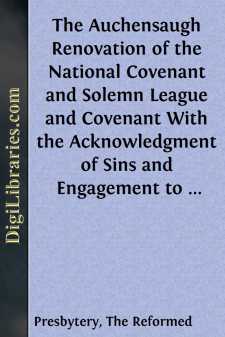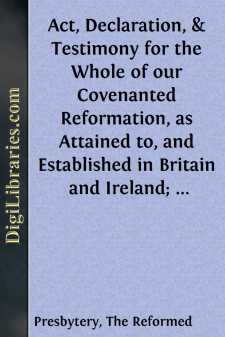Categories
- Antiques & Collectibles 13
- Architecture 36
- Art 48
- Bibles 22
- Biography & Autobiography 813
- Body, Mind & Spirit 142
- Business & Economics 28
- Children's Books 14
- Children's Fiction 11
- Computers 4
- Cooking 94
- Crafts & Hobbies 4
- Drama 346
- Education 46
- Family & Relationships 57
- Fiction 11829
- Games 19
- Gardening 17
- Health & Fitness 34
- History 1377
- House & Home 1
- Humor 147
- Juvenile Fiction 1873
- Juvenile Nonfiction 202
- Language Arts & Disciplines 88
- Law 16
- Literary Collections 686
- Literary Criticism 179
- Mathematics 13
- Medical 41
- Music 40
- Nature 179
- Non-Classifiable 1768
- Performing Arts 7
- Periodicals 1453
- Philosophy 64
- Photography 2
- Poetry 896
- Political Science 203
- Psychology 42
- Reference 154
- Religion 513
- Science 126
- Self-Help 84
- Social Science 81
- Sports & Recreation 34
- Study Aids 3
- Technology & Engineering 59
- Transportation 23
- Travel 463
- True Crime 29
The Auchensaugh Renovation of the National Covenant and Solemn League and Covenant With the Acknowledgment of Sins and Engagement to Duties, as They Were Renewed at Auchensaugh, Near Douglas, July 24, 1712. (Compared With the Editions of Paisley,...
Categories:
Description:
Excerpt
PREFACE.
The Reformed Presbytery, at a meeting in Philadelphia, October 6th 1880, "Resolved, That another edition of the Auchensaugh Deed be published," and appointed the undersigned a committee "to attend to this business with all convenient speed."
This Presbytery, after forty years' experience, during which opportunities have been afforded for examining the opinions and practices of all parties, professing any regard for the Covenanted Reformation, is still deeply impressed with the conviction that the transaction at Auchensaugh 1712, is the only faithful renovation of our Covenants, National and Solemn League. The fidelity of our fathers in that hazardous and heroic transaction, it is believed, has ever since been the occasion (not the cause) of all opponents manifesting their hostility to the whole covenanted cause, by first assaults upon that detested Bond. And that this is the real state of the case we proceed to prove by the following historical facts. First.—In connection with remodeling the Testimony; or rather by supplanting it in 1806, the Terms of Communion, without submitting an overture, were also changed to harmonize with Reformation Principles Exhibited, by excluding the Auchensaugh Renovation from the fourth Term, where it had stood for nearly a century. The same party have for years excluded from their abstract of Terms the Covenants themselves. Second.—In Scotland this faithful document was expunged in 1822, obviously to prepare the way for the adoption of a "New Testimony"(!), which appeared 1837-9. The majority of the actors in that work who survive, are now in the Free Church! Third.—At the time when defection was progressing in the R.P. Synod of Scotland, the sister Synod of Ireland strenuously resisted an attempt to remove the foresaid Bond from its place in the Terms. The Rev. Messrs. Dick, Smith and Houston in 1837, were faithful and successful for the time in resisting that attempt. Mr. Houston "would ever resist any alteration in respect of the Auchensaugh Bond, regarding the objection laid against it as in reality aimed at the Covenants themselves." Yet as a sequel to their Renovation of the Covenants at Dervock 1853, the Auchensaugh Bond was subsequently "shown to the porch"—removed from the Terms! Fourth.—At what was called covenant-renovation at Pittsburgh 1871, we believe no one spoke in behalf of their fathers' noble achievement in 1712. Indeed this could not be rationally expected in a body who could tolerate members vilifying the very Covenants which they pretended to renew. Fifth.—Other parties farther removed from the position of their reforming progenitors; but who still claim ecclesiastical affinity with John Knox, and commonly prefix to the symbols of their faith the historical word Westminster, give very strong expression to their feelings of hostility—not to the Auchensaugh Bond, of which probably they never heard, but to the British Covenants expressly; yea, to the very ordinance of public social covenanting itself....



